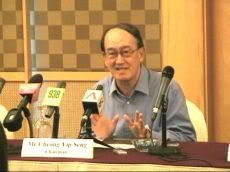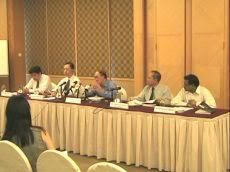Andrew Loh / Deputy Editor
Author’s Note: AIMs has clarified that they are not recommending a “blackout period”. Please see the clarification below, after the report. I apologise for the mistake.
 After months of consultation with various sectors of society and organizations, the Advisory Council on the Impact of New Media on Society (AIMs), finally presented its report on Internet regulations this morning.
After months of consultation with various sectors of society and organizations, the Advisory Council on the Impact of New Media on Society (AIMs), finally presented its report on Internet regulations this morning.
“If the Government warmly embrace what we are suggesting…it will lead to more diversity, more choices, more space for political discussion,” AIMs chairman, Mr Cheong Yip Seng, said at the press conference which was held at the Grand Copthorne Waterfront Hotel at Kim Seng Road.
The report, titled “Engaging New Media, Challenging Old Assumptions”, is a 224-page document, neatly packaged and given out to the media. It comes after consultation with groups such as the Law Society, Government Parliamentary Committees, businesses, bloggers and individuals.
As with previous public forums held by AIMs, the focus today was on the Films Act – particularly Sections 33 and 35.
Section 33 bans the making of party political films while Section 35 prohibits films which are “against the public interest”.
In its report, AIMs is proposing that the Government repeal Section 33 altogether – but in phases. Explaining why it is calling for the total repeal of the Section, AIMs gave the following reasons:
1.The present ban is too wide-ranging and stifling
2. Techonlogy has out-paced the law
3. Other legislation are already in place to deal with potential threats to our society
4. The present legislation is too restrictive
5. There is no reason why New Media cannot be responsibly used for political purposes..
But if the Section were to be repealed, AIMs suggested that the “risks that follow be managed.” It is with this in mind that it also recommends that a “blackout period” for political films during election periods be introduced into law. “During the blackout period, political parties, candidates and their agents as well as individuals are not allowed to distribute or exhibit new party political films as defined under the present Act,” it said in its report.
 Acknowledging that this is “open to criticism”, AIMs feels that this is a possible compromise between a “free-for-all” option and a “not-at-all” regime.
Acknowledging that this is “open to criticism”, AIMs feels that this is a possible compromise between a “free-for-all” option and a “not-at-all” regime.
To a question by The Online Citizen, Deputy Chairman of AIMs, Professor Tan Cheng Han clarified that this did not mean no new films would be allowed during election period. He cited the examples of “factual material” such as videos of election rallies or of political parties’ walkabouts during the hustings. These, he said, should be allowed.
Nonetheless, in lieu of full repeal, AIMs is suggesting that the Government decriminalize the making of political films as a first-step towards abolishment and also to narrow the scope of the law to target only party politial films which “intentionally mislead viewers”.
Turning to Section 35 of the Act, which gives the Minister the power to ban films which are “against the public interest”, AIMs proposes that it be retained in the law. It explained that it did not review Section 35 because “there are indeed films that are against the public interest,” citing the recent Dutch film Fitna as an example.
However, AIMs suggested two improvements to current legislation:
- That Section 35 is amended to spell out clearly the basis on which the Government should ban a film contrary to the public interest
- The independent advisory panel for party political films should advise the Minister before a film is banned under Section 35 and that the Minister should be obliged to give reasons for the ban.
“These two measures,” said AIMs, “is to address the concerns of those who fear that Section 35 would be used to limit political debate.”
Also in its list of proposals, AIMs asks the Government to allow civil servants to voice out their opinions online. It explained that these civil servants are in a unique position to articulate balanced and unique perspectives first-hand.
When asked by TOC if AIMs had approached any opposition parties for their views or if any opposition parties had voluntarily presented their views to AIMs, Mr Cheong said that no opposition parties had done so.
Mr Cheong, however, reiterated that if the Government accepted these proposals, Singaporeans would have a ‘broader space’ for political discourse and discussion.
TOC will do a fuller review of the AIMs report at a later time.
You can visit AIMs’ website here.
—–
Clarification from AIMs on “blackout period”:
I read your article on this morning’s press conference on TOC and would like to clarify a point.
In the below paragraph from your article:
But if the Section were to be repealed, AIMs suggested that the “risks that follow be managed.” It is with this in mind that it also recommends that a “blackout period” for political films during election periods be introduced into law. “During the blackout period, political parties, candidates and their agents as well as individuals are not allowed to distribute or exhibit new party political films as defined under the present Act,” it said in its report.
You had suggested that AIMS recommends a blackout period however, that quotation from the report is from page 68 which contains the recommendations we had proposed in the consultation paper.
In AIMS’ finalised recommendations from page 74, we had recommended that Section 33 of the Films Act be repealed in stages. There was no mention of any blackout period or any conditions attached to this ultimate goal of a total repeal.
We would like to clarify this and appreciate if you could amend your article to reflect this point as I imagine many bloggers would be referencing TOC for a summary of our press conference.
Thank you for taking your time to come down today and please feel free to contact me if you have any questions.
Yvonne
————-




